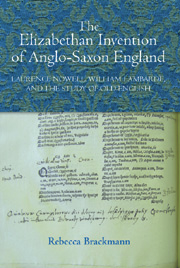 The Elizabethan Invention of Anglo-Saxon England
The Elizabethan Invention of Anglo-Saxon England Book contents
- Frontmatter
- Contents
- List of Illustrations
- Dedication
- Acknowledgements
- Chapter 1 The Anglo-Saxonists and Their Books: Print, Manuscript, and the Circulation of Scholarship
- PART I ANGLO-SAXON TEXTS AND SIXTEENTH-CENTURY ENGLISH
- Chapter 2 The Abcedarium Glossary: Sources and Methods of Nowell's Old English Lexicography
- Chapter 3 Inkhorns, Orthographers, and Antiquaries: Standardized English and the Dawn of Anglo-Saxon Studies
- PART II CHOROGRAPHIES AND THE PAST OF ENGLAND
- PART III OLD ENGLISH AND THE COMMON LAW
- Conclusion: The Invention of Anglo-Saxon England
- Bibliography
- Index
- Title in the Series
Chapter 3 - Inkhorns, Orthographers, and Antiquaries: Standardized English and the Dawn of Anglo-Saxon Studies
from PART I - ANGLO-SAXON TEXTS AND SIXTEENTH-CENTURY ENGLISH
Published online by Cambridge University Press: 05 February 2013
- Frontmatter
- Contents
- List of Illustrations
- Dedication
- Acknowledgements
- Chapter 1 The Anglo-Saxonists and Their Books: Print, Manuscript, and the Circulation of Scholarship
- PART I ANGLO-SAXON TEXTS AND SIXTEENTH-CENTURY ENGLISH
- Chapter 2 The Abcedarium Glossary: Sources and Methods of Nowell's Old English Lexicography
- Chapter 3 Inkhorns, Orthographers, and Antiquaries: Standardized English and the Dawn of Anglo-Saxon Studies
- PART II CHOROGRAPHIES AND THE PAST OF ENGLAND
- PART III OLD ENGLISH AND THE COMMON LAW
- Conclusion: The Invention of Anglo-Saxon England
- Bibliography
- Index
- Title in the Series
Summary
Nowell's Use of medieval manuscripts and the form of his Old English lexicographic works show his desire to establish a complete, regular, and stable canon of Old English words, juxtaposed with the modern language that had descended from it. His interest in English vocabulary past and present dovetails with the so-called ‘inkhorn controversy,’ a debate among Tudor thinkers and writers over the vocabulary of Early Modern English, and a critical issue for the writers and translators whom he knew. Many of these writers were closely associated with Nowell's employer, William Cecil: Roger Ascham and Sir Thomas Smith had known him for decades; John Hart and Arthur Golding lived, like Nowell, in Cecil's house. These authors all wrote about the contemporary English language with an eye to its nationalist potential. Nowell was surrounded by people who argued about the standardization of English vocabulary and spelling, and this context can supply answers to the enigma of his Abcedarium glossary. In contrast with Nowell, William Lambarde is not regarded as a major figure in the history of Old English lexicography. He did not share Nowell's impulse for dictionary-making in his manuscript notebooks, and unlike Nowell, when Lambarde translated Anglo-Saxon laws he chose to translate them into Latin, not English. His legal glossary at the beginning of Archaionomia is also written in Latin and alphabetized on Latin words, not Old English ones. However, his annotations in some of his books show a fuller picture of his own interest in Old English as the wellspring for Modern English.
- Type
- Chapter
- Information
- The Elizabethan Invention of Anglo-Saxon EnglandLaurence Nowell, William Lambarde, and the Study of Old English, pp. 55 - 84Publisher: Boydell & BrewerPrint publication year: 2012


